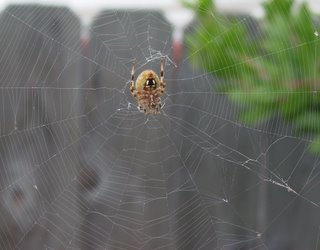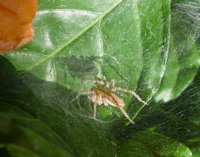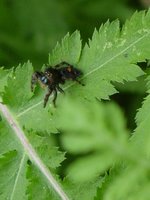
I must not fear.
Fear is the mind-killer.
The Spider Survey conducted by L.A. County Natural History Museum has so far cataloged over 175 species of spiders contributed by local citizens. Of these, the black widow, habitue of wood piles, crawlspaces, dry utility vaults and the like, is southern California's one notably dangerous spider. They are reclusive, even shy, but can be provoked to bite (like, why would you do that?), injecting their victim with a systemic neurotoxin that can be fatal. If you gotta work in their territory wear gloves, be alert, but if you are unlucky enough to be bitten by a black widow, see a doctor (preferably one that takes your insurance plan and knows something about systemic neurotoxins) right away. But all spiders have venom. That's how they subdue their prey. And prey they do on insects that fly and crawl, one after the other in a carnivorous procession. Spiders are important agents of biological control of pests including flies, mosquitoes, lots of plant damaging bugs, aphids, even sow bugs. Will they bite you? Spiders are reclusive, solitary creatures with no desire for human interaction. If bothered they might bite. The bites of a few species might cause harm. I have not been bitten even though I come within a fang's breadth of "molesting" some of them trying to get the perfect picture. As Charles Hogue would have said if he spoke Spanish, "No molestan las aranas." Because spiders do good but they might be cranky.

Still, there is a persistent fear of or at least prejudice against spiders amongst Americans. I'm willing to bet most citizens have never had face time with a green lynx or a sow bug killer (which might bite if you begged them to), let alone a black widow. People have mentioned fear or distaste for spiders in their comments on this blog. I don't take it personally, but I wonder why otherwise well meaning and intelligent folk distance themselves needlessly from an entire class of living things.
Fear is the little-death that brings total obliteration.
I will face my fear. I will permit it to pass over me and through me.
Mention (or Google) arachnophobia, and the movie comes up. The title is idiotic because the make-believe spiders in that film were deadly poisonous and aggressive, and any reasonable person would fear them if they were real. On the other hand, the mental disorder arachnophobia is by definition an irrational fear of spiders, and is therefore something quite different from healthy respect, distaste or even justified fear. Even so, spider phobia is said to be one of the most common among people of European descent.
One theory has it that our ancestors long long ago in the days before everything had traumatic consequences as a result of encounters with things like snakes, dark, or precipices creating a biological predisposition for fear of those things among us their progeny. This line of reasoning has merit, however in the case of spiders you would have to question why spider fear is not at least equally found among all the cultures of the world. And, Dr. Beetle wonders about and even experiments with the lack of genetically coded spider fear in flies . . . those who should fear them most.
Graham C.L. Davey theorizes the prevalence of arachnophobia among Europeans is due to a connection made centuries ago in the minds of ignorant dark-agers between spiders and the plague. No, spiders did not spread the plague, but the thesis is that somehow Europeans became implanted with a disgust respo
 nse because lots of random spiders were around when the plague plagued them. Disgust response is what you see when you find maggots wriggling in a forgotten potato or onion, or when your dog vomits on the hardwood floor. Disgust is a reasonable reaction to prevent one from eating moldy or infested food. Can disgust engender phobia? On Fredd Culbertson's extensive list of phobias siphonopteraphobia is not found even though it was fleas that spread the plague to humanity. Maggotphobia is not found; nor is flyphobia, or even botflyphobia, not mosquitophobia, nor tsetsephobia, though these species either spread disease, burrow into living flesh, or revel in filth. There is no bedbugphobia, although there is a phobia of lice, which seems more like a survival skill to me.
nse because lots of random spiders were around when the plague plagued them. Disgust response is what you see when you find maggots wriggling in a forgotten potato or onion, or when your dog vomits on the hardwood floor. Disgust is a reasonable reaction to prevent one from eating moldy or infested food. Can disgust engender phobia? On Fredd Culbertson's extensive list of phobias siphonopteraphobia is not found even though it was fleas that spread the plague to humanity. Maggotphobia is not found; nor is flyphobia, or even botflyphobia, not mosquitophobia, nor tsetsephobia, though these species either spread disease, burrow into living flesh, or revel in filth. There is no bedbugphobia, although there is a phobia of lice, which seems more like a survival skill to me.Could spider fear
 have been founded on an association of spiders with the Dark Side? Ooooooooo. Spiders are more evident in autumn, as the sun slips lower in the sky after the equinox. This is when the long hard-to-survive winter loomed large for our ancestors. Ancient Celts considered November 1 the new year, and believed the barriers between people and spiritual beings were lowered at this time. So a physical reality (shortening days, onset of winter and dormancy) took on supernatural meanings (communion with spirits) that was later given overtones of evil by churches. Spiders that had managed to go unnoticed through the happy bright spring and summer suddenly popped out with their big webs and big hairy selves in the autumn suddenly devoid of concealing foliage. And, they may have come to be associated with . . . the Dark Side. Oooooooooo. But spiders don't set out to be scary; they do not ally themselves with evil! They live their lives according to the spider code: hunt, grow, spin, grow, hunt, mate, hunt, spin, reproduce, hunt, die. They are big in autumn because . . . they've been hunting and eating and growing all summer long. Have they taken on shades of meaning (Evil . . . Scary . . . Danger!) for humans susceptible to myths? Or have centuries of reason, central heating, and electronic entertainment helped to overcome spider superstition?
have been founded on an association of spiders with the Dark Side? Ooooooooo. Spiders are more evident in autumn, as the sun slips lower in the sky after the equinox. This is when the long hard-to-survive winter loomed large for our ancestors. Ancient Celts considered November 1 the new year, and believed the barriers between people and spiritual beings were lowered at this time. So a physical reality (shortening days, onset of winter and dormancy) took on supernatural meanings (communion with spirits) that was later given overtones of evil by churches. Spiders that had managed to go unnoticed through the happy bright spring and summer suddenly popped out with their big webs and big hairy selves in the autumn suddenly devoid of concealing foliage. And, they may have come to be associated with . . . the Dark Side. Oooooooooo. But spiders don't set out to be scary; they do not ally themselves with evil! They live their lives according to the spider code: hunt, grow, spin, grow, hunt, mate, hunt, spin, reproduce, hunt, die. They are big in autumn because . . . they've been hunting and eating and growing all summer long. Have they taken on shades of meaning (Evil . . . Scary . . . Danger!) for humans susceptible to myths? Or have centuries of reason, central heating, and electronic entertainment helped to overcome spider superstition?I took a survey of friends and family, mostly of European descent. Most everyone said they feel fearful when a spider surprises them, say, by falling out of their pajamas, but they quickly recover their wits and deal with the creature sensibly. In the classic fight or flight response, they choose to fight or at least use tissue to flick the thing into a jar and put it outdoors. And a lot of these people said they feel disgust when they blunder into a soggy web in the early morning; but they also admit they are more disgusted with themselves for forgetting--again--the orb weavers do indeed like that particular spot to spin. Maybe they were just being nice (not wanting to offend my sensibilities) but many of them threw in comments about the good work spiders do around the house, and yes we know they are not all deathly poisonous. In short, I'm lucky to be surrounded by reasonable folk. Or maybe they're buttering me up for better holiday gifts.
And when it has gone past I will turn the inner eye
to see its path. Where the fear has gone
there will be nothing.

As for the rest of western civilization which continues to wrong-headedly fear and loathe spiders, I offer a few of my personal theories as to why:
A. Spiders REALLY ARE SCARY, in fact EVIL. A very old Bible nibbled at by booklice was found by a reformed embezzler in a very old church outside of Glasgow; the missing letters were written down, fed into a computer, and found to spell out a message of dire warning against fraternizing with spiders. The belief goes the spiders--all of them!--are just waiting for the eighth sign before unleashing unspeakable terror on humanity. Only a select group of believers knows the whole truth and prophecy; these Selected Few direct missions to spread fear of spiders amongst their countrymen in hopes of personal salvation or at least contributions to the cause.
B. Western civilization has created people who are much like spiders: We hole up in our private castles, acquiring goods far beyond our actual needs, we practice ritual killing of our mates (divorce), and so on. So we project our self-loathing onto the hapless spiders of the world.
C. Being scared of things that aren't scary breaks up the boredom of day to day existence. It gives you things to talk about with your friends, and also compete against them with, but requires little mental or physical exertion to participate in. Urban legends about spiders are common (did you hear about the bottle of Pom with the mutated spider inside the cap?). It's so much more exciting to believe the harmless spider you flushed down the toilet was a deadly brown recluse. Wow, you were this close to death!

D. Spiders are our scapegoats. If we're having a bad day or feeling inadequate we can squish a helpless spider and feel so much better about ourselves.
E. Spider fear is just a social convention, like dressing baby girls in pink or wearing a red tie to a political debate. Like going to your school's football games even though your sport is creative writing and no football player has ever come to one of your readings, now have they? Like going along with bad policies for the good of the country or voting the party line, fearing spiders is just the right thing to do. Only a select group of people knows the whole truth: that spiders AREN"T SCARY but since we westerners act like we think they are, the whole rest of the world is either laughing at us or plotting to overthrow our spider-fearing way of life by means of a spider-blitz. This Select Group has been tasked with getting people to think about spiders in a new light, thereby vaccinating the population against the spider terror attack.
Well these are after all just theories, like intelligent design or the theory of declining second terms. I offer them so you can consider whatever feelings you have toward spiders in new ways. And because I really like to hear myself type.
Only I and the spider
will remain.

btw, an upsurge in the numbers of several species of local spiders--cyclopsa turbinata, putricia viridans, and several philistus species--has been noticed by the Agricultural Extension Office. They say they are seeking funding from the state to monitor this trend and determine what impact the doubling, and in some cases quadrupling, of the numbers of these spiders will have on Orange County. More on this as it develops.
Apologies to Frank Herbert.
6 comments:
My thoughts keep returning (with a giggle) to the notion of a spider falling out of someone's pajamas, and wondering if the person was wearing them at the time!
:: shiver ::
I've had spiders fall out of my clothes twice in my life, and I remember them both vividly.
That'll teach you to keep your room clean in a hurry.
Just today I had a black spider, probably a widow, crawl up my pant leg after distrubing it's spot under an old ceramic piece. Not sure which of us was more freaked out.
My favorite pastime while working at my computer is to watch my window sill spiders catch flies and twirl them up in web. The flies make a sad and plaintive noise that sounds not unlike my washing machine filling with water out in the garage.
P.S. I don't feel sorry for the flies. Does that make me a bad person?
Spiders do a good job. I like those huge trapdoor spiders... but very hard to find. Do you get white tails in California?
So, boogs: spiders taught what your mother could not? Thank you spiders.
babie: we don't get trapdoor spiders much in the city. I guess the white tailed spider is an Australian species; sounds interesting.
this is the best blog i have ever read. i am going to take a fresh look at my relationship with spiders. thanks!
Post a Comment